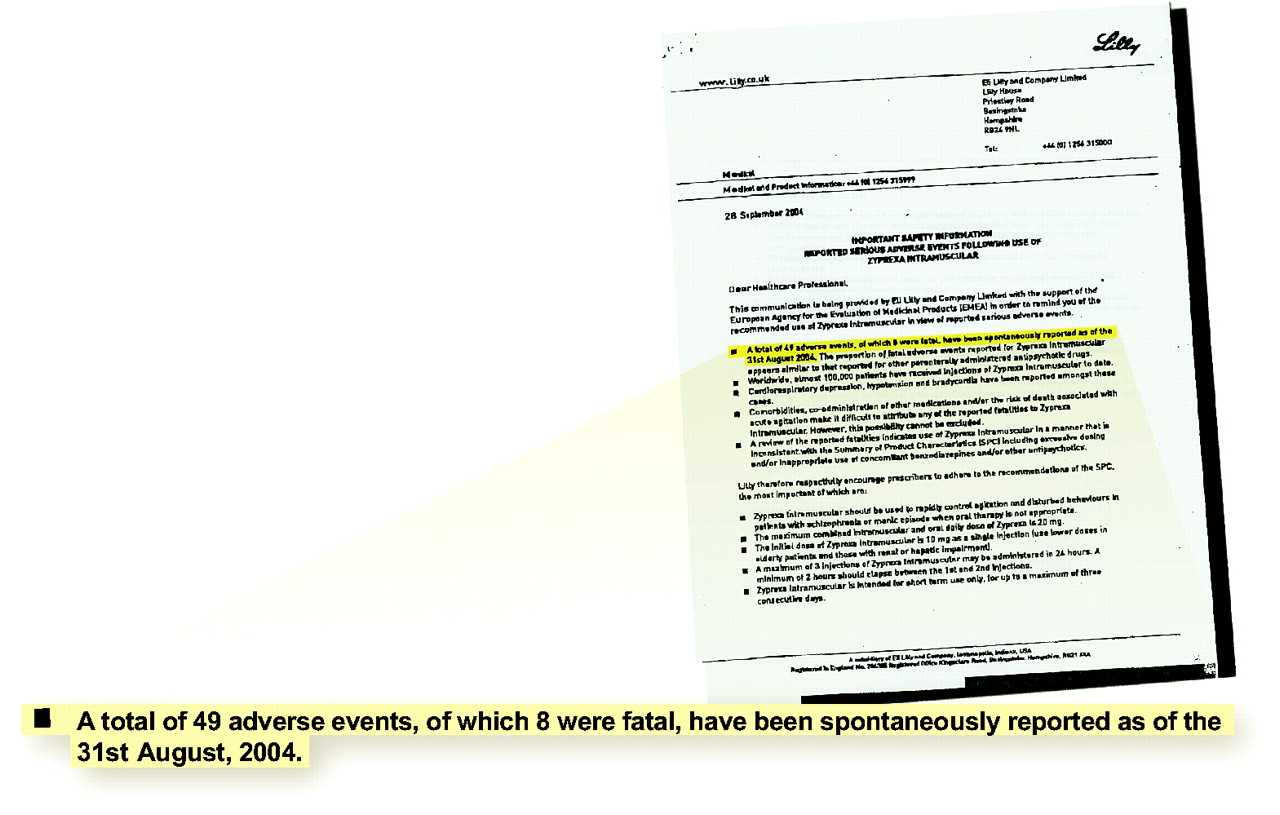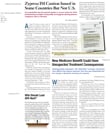At least 49 adverse events, some of which were related to cardiac and respiratory depression and some of which have been fatal, have been associated with inappropriate use of the intramuscular formulation of olanzapine, marketed as Zyprexa IM.
If you are a psychiatrist in Canada, the United Kingdom, or Europe, that may be old news: you might have read about these problems in “Dear Healthcare Professional” letters requested by regulatory authorities in Canada and Europe, distributed widely to prescribing psychiatrists, and signed by Zyprexa manufacture Elli Lilly and Co.
A letter dated September 28, 2004, alerted European clinicians to eight fatal adverse events, among 49 spontaneously reported adverse events, associated with use of Zyprexa IM. Lilly sent the letter at the request of the European Medications Evaluation Agency (EMEA), the European equivalent of the U.S. Food and Drug Administration.
Lilly sent a similar letter, detailing clinical examples of inappropriate use of the drug that resulted in death, to Canadian psychiatrists at the request of the Canadian health ministry known as Health Canada. That letter, which noted that 29 of the 49 adverse events were classified as“ serious,” was dated September 7, 2004.
Yet Lilly has sent no such letter to American physicians, and the FDA has not required it.
European psychiatrists who have seen the “Dear Healthcare Professional” letters from Lilly told Psychiatric News that the information warrants being made available to American clinicians. That it was not disturbs at least one American psychiatrist who believes it underscores widening concerns about the FDA's postmarketing oversight of drug safety.
“Why would fatalities be of less interest to U.S. physicians?” asked emergency psychiatrist Michael Allen, M.D. “I can't understand why we would receive less information than our European colleagues.”
Allen was among the first to alert American physicians to the risks through an article in Emergency Psychiatry, the newsletter of the American Association of Emergency Psychiatrists. He believes the information about cardiovascular risks associated with Zyprexa IM is important because the drug has been marketed aggressively to American physicians who may be using it in ways that could put patients at risk.
As an injectable, the intramuscular formulation quickly reaches much higher blood levels than does the oral medication; it is also an alpha 1 antagonist and as such might be expected to affect blood pressure.
Allen is director of psychiatric emergency services and an associate professor of psychiatry at the University of Colorado Health Science Center in Denver. He has ties to a number of pharmaceutical companies, including Lilly and Pfizer, through research, consulting, and development of educational materials.
Lilly representative Heather Lusk told Psychiatric News that the company is “proactively discussing appropriate use and dosing” of the medication with physicians through its sales representatives. “We have no plans to do anything beyond what we are currently doing, which is to educate physicians through our sales representatives.”
Both American and European psychiatrists who spoke with Psychiatric News agreed that it is not possible to attribute fatal adverse events to Zyprexa IM alone; all of those events appear to have occurred in high-risk subgroups and/or following concomitant use of Zyprexa IM with other medications, including benzodiazepines.
Paul Andreason, M.D., team leader for psychopharmacology at the Division of Neuropharmacologic Drug Products at the FDA, told Psychiatric News that the agency was aware of the adverse events and of the European alert, but had determined that the adverse events did not represent a safety signal.
Andreason said that of the eight deaths, one was the result of a fall from a wheelchair, one was the result of a completed suicide, and one was the result of a pulmonary embolism.
“That left five sudden and unexplained deaths,” Andreason said.“ With more than 87,000 exposures, we didn't think that this represented a safety signal above the expected background rate in this population. However, we will continue to watch this.”
Risks From Accumulating Doses
European psychiatrists who spoke with Psychiatric News questioned why the FDA and Lilly had chosen not to inform American physicians about adverse events associated with Zyprexa IM in an official, uniform fashion similar to the way European and Canadian clinicians have been notified.
Robert Kerwin, M.B, D.Sc., a professor of clinical neuropharmacology at the Institute of Psychiatry in London, said there are clear risks associated with accumulating doses of Zyprexa IM in high-risk patients and in combination with other medications.
“The question is why the same information was not given to American physicians,” said Kerwin.
Psychiatrist Wolfgang Fleischhacker, M.D., of the department of biological psychiatry at Innsbruck University Clinics in Austria, reiterated the belief that it is all but impossible to attribute the adverse events to Zyprexa IM alone.
“Generally, the cases occurred in the context of polypharmacy, and they were all in patients with concomitant medical disorders,” he told Psychiatric News. “From the information I have, in not a single instance could I attribute the deaths to olanzapine alone. But I think our American colleagues should have the same information we have. I am not sure why the letter sent by Lilly in collaboration with EMEA was not also made available in the United States.”
Fleischhacker was also critical of Lilly's claim in the European letter that the proportion of fatal events appeared to be similar to that reported for other parenteral antipsychotics.
“I am not aware of any relevant comparative evidence, and I strongly doubt that either the regulatory agencies or Lilly have information that would lend scientific support to such a statement,” he said.
When asked by Psychiatric News, Lusk said the claim in the letter was based on data on competitors' products that was held by the EMEA and hence could not be released by Lilly. “It is our understanding that the EMEA was comfortable with that statement in the letter,” she said.
Allen said some American “thought leaders” received a letter from Lilly last October referencing eight deaths associated with use of Zyprexa IM. But the letter made no mention of other nonfatal adverse events reported to Canadian and European physicians, he said.
In general, Allen said he is concerned that the episode may reflect a pattern of minimizing side effects associated with Zyprexa that goes back to concerns about weight gain and metabolic effects in the oral formulation and that now appears to be continuing with potentially more serious problems in the intramuscular form.
In fact, a marketing war between Lilly and Pfizer Inc. focused attention on the side effects of their respective competitive antipsychotic products: metabolic and other effects associated with olanzapine, and QT prolongation associated with ziprasidone, marketed by Pfizer as Geodon (Psychiatric News, August 3, 2001).
In response to queries about the fatalities associated with Zyprexa IM, Lusk suggested that similar problems may have turned up with ziprasidone IM.
However, no equivalent regulatory warning has been issued with regard to ziprasidone IM, either in the United States or in Europe. Antony Loebel, M.D., who is Pfizer's U.S. medical team leader for Geodon, denied that any of the problems cited in the European letter about Zyprexa IM have been found to be associated with Geodon IM.
“The bottom line is that there is no safety signal for Geodon IM either alone or in combination with benzodiazepines,” Loebel told Psychiatric News. “There is no signal with respect to adverse events such as bradycardia, cardiorespiratory depression, or hypotension, and no letter has been requested to be sent out by Pfizer.”
FDA Under Gun Again
Allen said he believes the episode speaks to concern about the FDA's postmarketing oversight of drug safety.
“The history of the FDA is really about marketing of drugs, and its roots go back to `snake oil' and preventing the promotion of drugs that had no benefit,” Allen said. “So its raison d'être was to require people who were promoting drugs to show that they work so people weren't being sold snake oil.”
But once a company produces data that rise to a certain threshold of proof that the drug is safe and effective, and the drug is on the market, the burden then shifts.
“Prior to marketing, the burden is on the company to show a product is generally safe and effective in certain populations,” Allen said.“ After marketing, the product may be used in circumstances where it has not been studied—for instance, in children—but the burden shifts to others to prove the product is not safe, and that is difficult.
“There is a sense that the FDA is too focused on this narrow definition of efficacy and that not enough attention is paid to safety of medications once they are on the market,” he continued. “That is the difference between the United States and other countries, where there is more of a consumer watchdog focus by regulatory agencies. If it's a good idea to have a registry of clinical trials, perhaps it would be a good idea to open the pharmacovigilance data.” ▪

